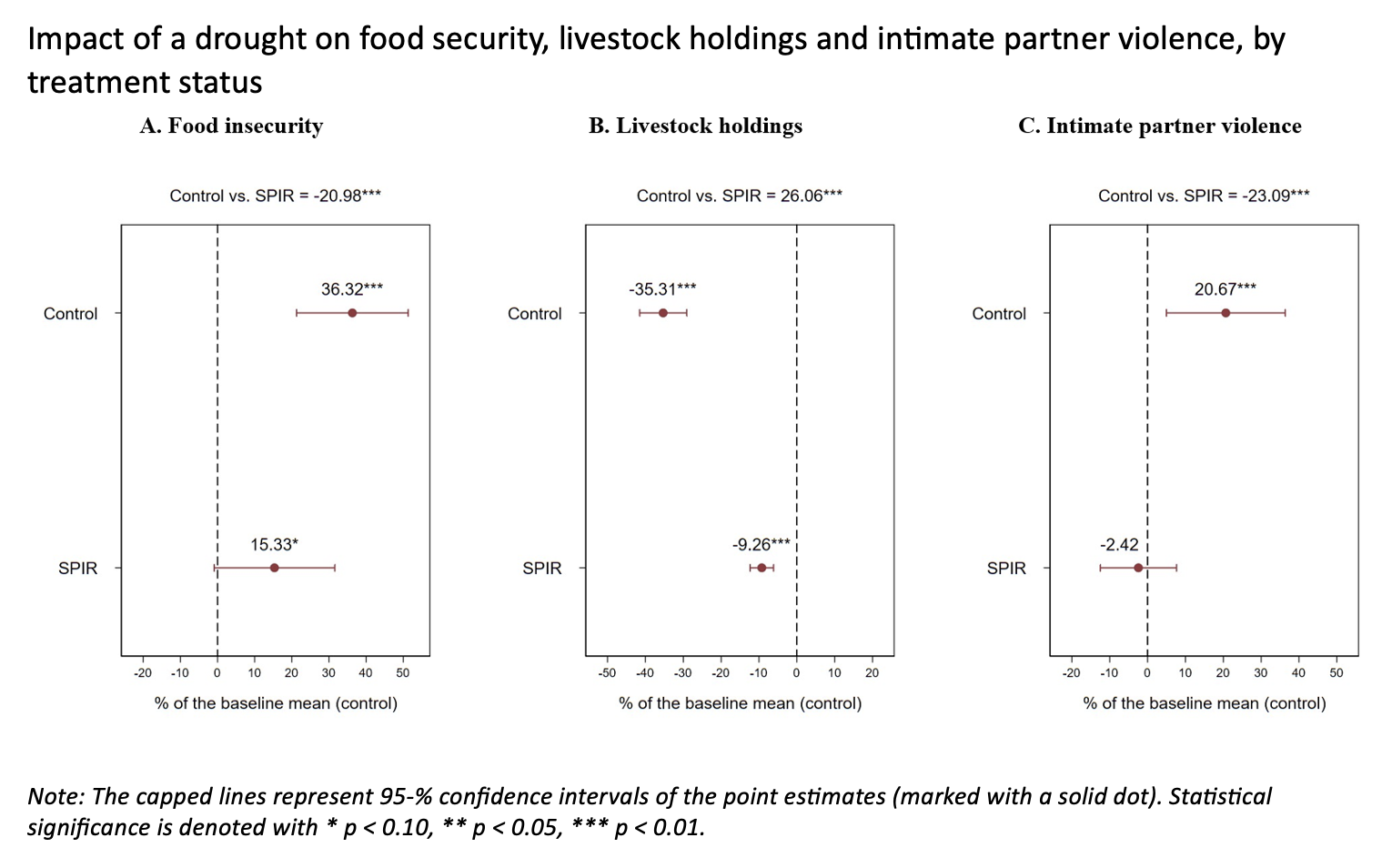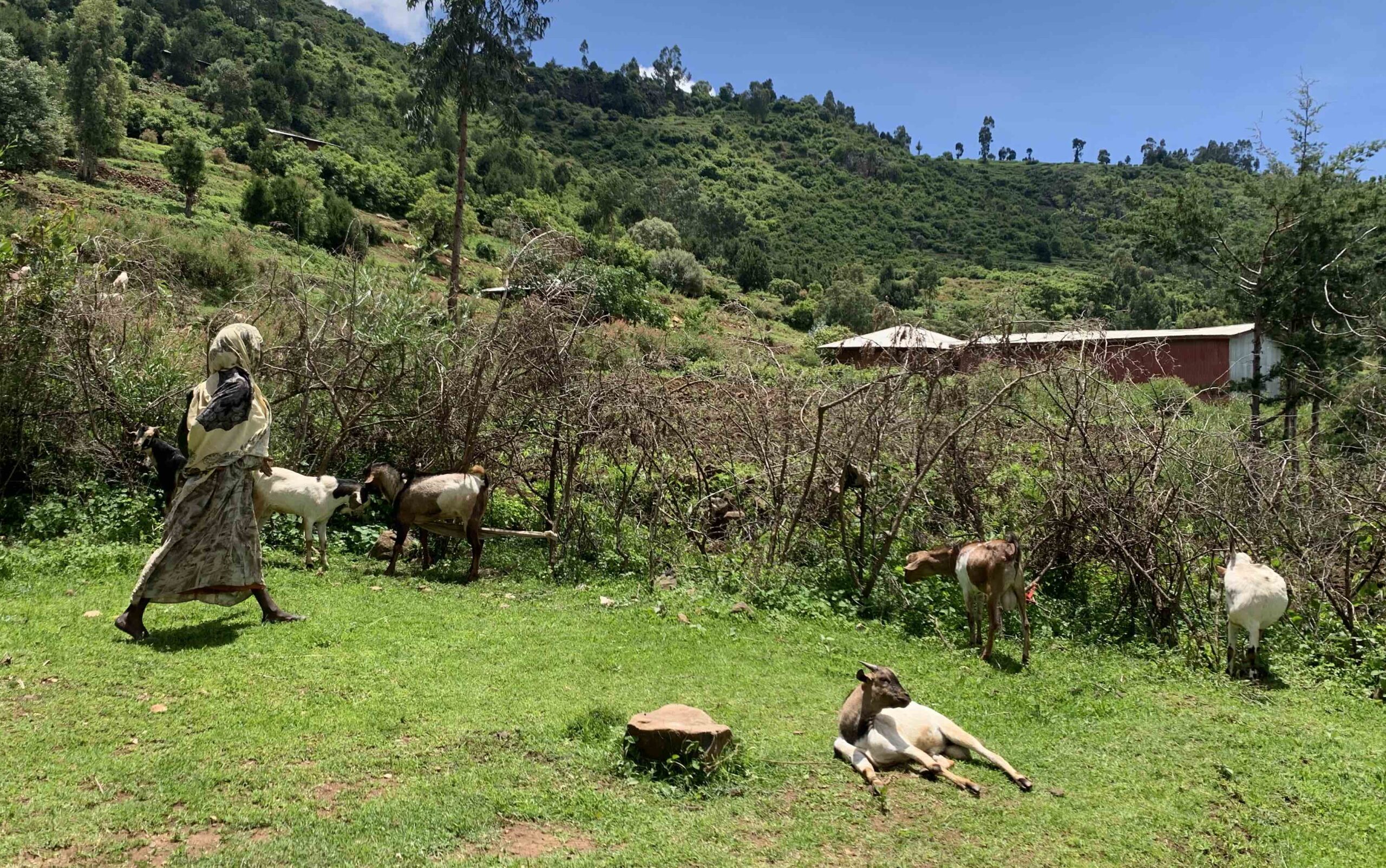A growing body of evidence now suggests that global warming increases the risk of extreme weather events such as droughts, floods, and tropical cyclones (Seneviratne et al. 2021), and these shocks often force poor households to consume less or sell valuable assets, worsening their food security and increasing their vulnerability to chronic poverty. These effects can be particularly salient for women, who often have less resources than male family members even within poor households (Fruttero et al. 2023, van Daalen et al. 2020), and who may face increased vulnerability to violence (Abiona and Koppensteiner 2018, Díaz and Saldarriaga 2023, Epstein et al. 2020). The high and growing incidence of climate-related shocks has only increased the importance of identifying interventions that can strengthen households’ resilience against the adverse consequences of these shocks.
Experimental design: Analyzing a graduation model in the context of drought shocks
In a recent paper (Hirvonen, Gilligan, Leight, Tambet, and Villa (2023), we provide new evidence around the effects of a graduation model intervention in increasing resilience against localized droughts in rural Ethiopia, a country with a long history of devastating droughts (De Waal 2017). The intervention of interest, Strengthen PSNP Institutions and Resilience (SPIR), was delivered to households participating in the Productive Safety Net Programme (PSNP), a long-standing social protection platform providing cash or food transfers to the poorest and most vulnerable households in rural areas historically prone to drought. SPIR centered around the formation of village economic and social associations (VESAs) as a platform for livelihoods training and nutrition-related behavior change communication. Additionally, the poorest households also received a $200 lump-sum transfer of cash or equivalent amount in poultry. Importantly, the set of livelihood interventions and transfer amounts were considerably smaller in scope when compared to well-known graduation model programs originally designed by BRAC and evaluated in Banerjee et al. (2015) and Bandiera et al. (2017).
SPIR was also evaluated in a large-scale randomized controlled trial designed to assess the effects on outcomes in a sample of 3,314 households in 192 clusters across two regions (Leight et al. 2023). The multi-arm RCT was designed to evaluate combinations of four interventions: Core livelihood activities and core nutrition activities as well as enhanced versions of both types of activities.
We mapped detailed satellite data on weather events to three rounds of household survey data collected by the trial (in 2018, 2019, and 2021) to understand whether and how this light-touch graduation program protected households against the effects of droughts. We then analyzed exogenous variation in program exposure induced by the cluster RCT in conjunction with both longitudinal and cross-sectional variation in drought incidence. Our primary measure of drought is constructed using the Standardized Precipitation-Evapotranspiration Index (SPEI) (Vicente-Serrano et al. (2010) and captures dryness as any negative deviation relative to the long-term mean, corresponding to even moderate fluctuations (rather than extreme weather anomalies only).
Results: Contrasting the impact of droughts in control versus treatment communities
Our findings suggest that even these moderate changes in relative dryness during the main cropping season lead to economically meaningful fluctuations in household welfare as well as women’s health and welfare, specifically. More explicitly, we focus on the effects of a 0.25 standard deviation increase in relative dryness defined with respect to the locality-specific long-term mean. In communities of the control arm not served by SPIR, a drought of this magnitude leads to a 36% increase in self-reported food insecurity (the food gap), a 35% decrease in aggregated livestock holdings, and a 21% increase in the risk of intimate partner violence. These effects are captured graphically in Panels A to C in Figure 1 below (the row marked “Control”).
Figure 1

However, the corresponding effects of these drought shocks are either partially or completely muted for households that resided in clusters that received SPIR programming (the row corresponding to “SPIR” in Figure 1). In drought-affected clusters served by SPIR, the increase in the food gap is roughly half the magnitude of the increase observed in drought-affected clusters in the control arm (Panel A), while the decline in livestock holdings is less than a third of the corresponding decline in drought-affected control clusters (Panel B); and drought does not lead to any significant increase in IPV at all in clusters served by SPIR (Panel C).
Further analysis of the mechanisms for these effects suggests that there is little evidence of any heterogeneity across different SPIR treatment arms that offered different combinations of interventions; rather, the primary mechanism seems to be a substantial relative increase in savings that is attributable to the establishment of VESAs and observed consistently among all households served by SPIR (including those who did not receive one-time cash or poultry transfers). In the face of a drought shock, treated households then use this enhanced stock of savings as a means to mitigate the impact of the shock, allowing them to smooth consumption and partially protect productive (livestock) assets.
Policy implications
This new evidence suggests a potentially promising strategy for developing and refining interventions to protect the very poorest households against the adverse effects of more widespread weather shocks. Our research builds upon the work of Macours et al. (2022), who evaluated the impact of complementary livelihood interventions on beneficiaries of a short-term safety net program in rural Nicaragua. Similar to our findings, they discovered that transfers offered via a safety net program alone are inadequate in protecting households against the negative impacts of weather shocks. However, our study differs as it reveals that the main coping mechanism is not through diversification into non-agricultural activities, as seen in Nicaragua, but rather through buffer stock savings. These results are significant as they suggest that even modest interventions can enhance resilience within existing safety net programs, particularly in areas with limited non-agricultural income opportunities.
Kalle Hirvonen is a Senior Research Fellow with IFPRI’s Development Strategies and Governance Unit; Daniel Gilligan is Director of IFPRI’s Poverty, Gender, and Inclusion (PGI) Unit; Jessica Leight is a PGI Research Fellow; Heleene Tambet is a PGI Research Analyst; Victor Villa is a CGIAR Climate Security Specialist. This post first appeared on VoxDev. Opinions are the authors’. It is based on research that is not yet peer-reviewed.
This research was funded through the CGIAR Research Program on Harnessing gender and social equality for resilience in agrifood systems (HER+). The original trial was funded by the United States Agency for International Development (USAID) through a subaward to World Vision.
Referenced Discussion Paper:
Hirvonen, Kalle; Gilligan, Daniel O.; Leight, Jessica; Tambet, Heleene; and Villa, Victor. 2023. Do ultra-poor graduation programs build resilience against droughts? Evidence from rural Ethiopia. IFPRI Discussion Paper 2206. Washington, DC: International Food Policy Research Institute (IFPRI). https://doi.org/10.2499/p15738coll2.137000







